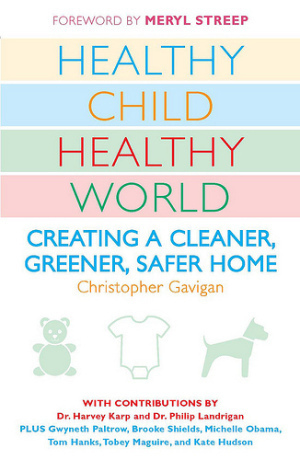As initially posted on Healthy Child Healthy World.
At the end of this week, all eyes will be on Copenhagen when President Obama finally arrives for the end of the beleaguered and tenuous Climate Change Summit. But one very promising and exciting accord has already been made in Denmark, and its impacts will hopefully resonate throughout the country.
Recently, Governor Schwarzenegger announced a partnership between the State of California and Denmark to cooperate in the construction of a new public endeavor to protect consumers against harmful chemical exposure.
California is currently developing a program under last year's landmark Green Chemistry Initiative (passed into law in September 2008) with the lofty yet vital objective of changing the way our society manufactures, produces, and uses industrial chemicals for commerce. The overarching goal is not simply to discourage the use of hazardous chemicals and avoid the toxic waste they produce, but to reinvent the proverbial wheel.
By including chemicals as part of the clean technology revolution, the production, use, and disposal of chemicals -- and the products made from them -- will be "benign by design." They will not endanger the consumer or the environment at any stage of their life cycle. The ethos is "cradle to cradle," fundamentally reshaping the way we design and produce consumer goods, as articulated by sustainable designer and architect William McDonough, a visionary leader who is setting the stage for a huge paradigm shift.
California's program would create a database that can track and monitor ingredients in our everyday products, including shampoo, cosmetics, and toys. And going even further, it would mandate and facilitate the creation of ingredient labels for these same household products, to increase transparency from the manufacturer, and increase awareness on the part of the consumer.
The program would also address the thousands upon thousands of industrial chemicals that were grandfathered into the current (and very broken) chemical regulatory system in 1976, called the Toxic Substances Control Act. Under that legislation, over 60,000 chemicals already in use were assumed safe and left untested.
Improving consumer protection from chemical exposure has long been a top priority of Governor Schwarzenegger. Calling the agreement "groundbreaking," he hopes California will provide a structural model and inspiration for the rest of the country by proving that "sub-national governments can take action to make change."
So, why Denmark, you ask? Under Europe's uncompromising REACH program (their version of chemical regulation -- decidedly not broken, by the way), Denmark has built an impressive database and infrastructure for chemical management. Their support for California's fledgling program is invaluable. Denmark will advise on critical development decisions, share data and best practices, and assist in building enforcement mechanisms.
Schwarzenegger's environmental leadership will be a large part of his legacy as Governor, and California will continue to be at the vanguard of the new green paradigm. But the federal government is also gearing up to play a bigger role. After the holidays (finally), a bill will be introduced in Congress to overhaul the useless and horribly flawed Toxic Substances Control Act (with hundreds of NGO groups aligning under the banner of Safer Chemicals/Healthy Families coalition), and empower the US EPA to regulate chemicals properly.
Should Congress decide to tackle this overhaul and get serious about protecting the public from chemical exposure, they might look to California (and Denmark) for an example of proactive action and appropriately prioritizing human health and the health of our most precious resource -- our children.
Christopher Gavigan is the author of Healthy Child Healthy World.
